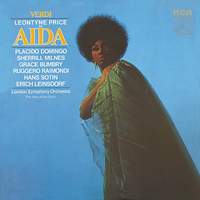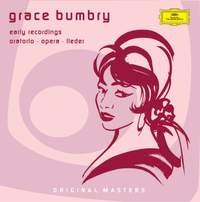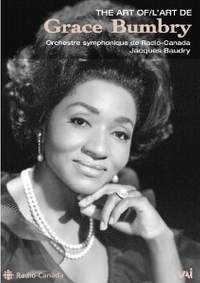Obituary,
Grace Bumbry (1937-2023)
The trailblazing American mezzo Grace Bumbry, who made operatic history as the first Black artist to appear at the Bayreuth Festival, died on Sunday aged 86.
The daughter of a teacher and a railroad-worker, Grace Melzia
Bumbry was born in St. Louis in 1937 and received her
early education at the Charles H. Sumner High School, where her love of singing
(initially ignited by listening to recordings of Marian Anderson) was nurtured
by Kenneth Billups and Sara Hopes. At 17 she won a prestigious local radio
talent-contest, the prize for which included a scholarship to the St. Louis Institute
of Music; as a Black student, Bumbry was not permitted to take up her place
there, but her victory led to a TV appearance on the popular variety-show Arthur Godfrey's Talent Scouts. Even at this young age, Bumbry was already confidently tackling
the dramatic mezzo repertoire which would be the main focus of her career,
choosing to sing Eboli’s fiercely demanding ‘O don fatale’ from Verdi’s Don Carlo
– an opera which she went on to perform on many of the world’s major stages,
and to record for Sir Georg Solti in 1965.
With opportunities in the racially-segregated South limited, Bumbry studied briefly in Boston and then at Northwestern University in Illinois, where she caught the ear of the great Wagnerian soprano Lotte Lehmann; after three years of study with Lehmann in California, she won the Metropolitan Opera’s National Council Auditions in 1958 and made her professional operatic debut at the Paris Opera (as Amneris in Aida) two years later before spending some time honing her craft as a house singer in Basel, where her roles included Saint-Saëns’s Dalila, Gluck’s Orfeo and Bizet’s Carmen.
It was in 1961 that Bumbry came to widespread international attention when Wieland Wagner cast her as Venus in his production of Tannhäuser at Bayreuth. The Festival had never previously engaged a Black singer, and in the run-up to the opening night Bumbry was subjected to a barrage of racist vitriol from the right-wing press; decades later, she recounted telling herself ‘This isn’t your problem, Grace’ and shutting out much of the noise in order to focus squarely on the task at hand. She had the public support of her director (who declared ‘Grandfather would have loved her!’), and her debut proved an undisputed triumph, prompting 42 curtain-calls; she was still just 24.
Despite the challenging circumstances Bumbry described her experience at Bayreuth as being ‘burned into my happiest memories’, and from there her career went from strength to strength; in the immediate aftermath of her success as Venus Jacqueline Kennedy invited her to sing at the White House, and debuts at La Scala, Covent Garden and the Metropolitan Opera all followed in the next few years. With her magnetic stage-presence and powerful yet flexible mezzo, Bumbry excelled in dramatic roles such as Verdi’s Amneris and Eboli, Bizet’s Carmen and Laura Adorno in Ponchielli’s La Gioconda, and her gleaming, rock-solid upper register also lent itself well to zwischenfach assignments including Verdi’s Lady Macbeth and Santuzza in Mascagni’s Cavalleria rusticana.
In 1970 Bumbry made her first foray into true dramatic soprano territory, singing the title-role in Strauss’s Salome at Covent Garden (when Opera Magazine declared her to be 'one of the most convincing Salomes ever to have tempted John the Baptist on the stage of the Royal Opera House - or indeed anywhere else'), and over the course of the next decade she enjoyed great success as Tosca, Turandot, Aida, Abigaille, Medea, Leonora in both La forza del destino and Il trovatore, and Norma. (During a 1977 run of the latter opera at Covent Garden she alternated between the title-role and Adalgisa, opposite Josephine Veasey and Montserrat Caballé respectively, and a live studio recording from the Festival della Valle d'Itria that same year offers a rare, exhilarating opportunity to hear her in soprano repertoire on disc). Her non-Italian repertoire included Cassandre in Berlioz’s Les Troyens, Bess in Gershwin’s Porgy & Bess (though she expressed discomfort with the piece’s stereotypical depiction of African-Americans), and the title-role in Janáček’s Jenůfa, which she sang in Italian at La Scala in the mid-70s.
In the latter part of her career Bumbry gravitated back towards the dramatic mezzo repertoire; her official farewell to the operatic stage came in 1997, as Klytaemnestra in Strauss’s Elektra, but she re-emerged in her seventies to sing The Old Lady in Bernstein’s Candide and The Countess in Tchaikovsky’s Pique Dame. In the 1990s she set up the Grace Bumbry Black Musical Heritage Ensemble in order to bring spirituals to a wider audience, and in 2009 she founded the Grace Bumbry Vocal and Opera Academy in Berlin, designed to provide specialist training for young dramatic voices; she taught private students and masterclasses (both online and in person) well into her eighties, declaring on her website that she believed it her duty to ‘to pass on tradition, style and the insatiable love for opera and music to all who want to obtain it’. A lifelong fashion enthusiast, she enthusiastically embraced Instagram in the last decade of her life, delighting her many fans with her wit, charisma and enduring glamour.
Bumbry’s many accolades included an award at the Kennedy Center Honors in 2009, a UNESCO Award, and the title of Commandeur des Arts et Lettres in recognition of her long and distinguished relationship with the Paris Opera. In October 2022 she suffered a stroke whilst flying home from New York and never regained her health; she died in Vienna on 7th May.
Grace Bumbry - a selected discography
Wolfgang Windgassen (Tannhäuser), Victoria de los Angeles (Elisabeth), Grace Bumbry (Venus), Josef Greindl (Landgraf), Dietrich Fischer-Dieskau (Wolfram)
Bayreuther Festspielorchester, Bayreuther Festspielchor, Wolfgang Sawallisch
Available Formats: MP3, FLAC
Leontyne Price (Aida), Grace Bumbry (Amneris), Plácido Domingo (Radamès), Sherrill Milnes (Amonasro), Ruggero Raimondi (Ramfis), Hans Sotin (Il Re)
London Symphony Orchestra, John Alldis Choir, Erich Leinsdorf
Available Formats: MP3, FLAC, Hi-Res FLAC
Carlo Bergonzi (Don Carlo), Renata Tebaldi (Elisabetta), Grace Bumbry (Eboli), Nicolai Ghiaurov (Filippo II), Dietrich Fischer-Dieskau (Rodrigo), Martti Talvela (Il Grande Inquisitore)
Orchestra & Chorus of the Royal Opera House, Covent Garden, Sir Georg Solti
Available Formats: MP3, FLAC
Dietrich Fischer-Dieskau (Macbeth), Grace Bumbry (Lady Macbeth), Peter Lagger (Banco), Bozena Ruk-Focic (Dama), Ermanno Lorenzi (Macduff), Francisco Lazaro (Malcolm)
Wiener Philharmoniker, Kammerchor der Salzburger Festspiele, Wolfgang Sawallisch
Available Formats: 2 CDs, MP3, FLAC
Grace Bumbry (Norma), Lella Cuberli (Adalgisa), Giuseppe Giacomini (Pollione), Robert Lloyd (Oroveso), Eugenia Cardano (Clotilde), Paolo Todisco (Flavio)
Bari Symphony Orchestra, Amici della Polifonia e Voci Per La Musica Chorus, Michael Halász
Available Formats: 2 CDs, MP3, FLAC
Dame Joan Sutherland (soprano), Grace Bumbry (mezzo), Kenneth McKellar (tenor), David Ward (bass)
London Symphony Orchestra & Chorus, Sir Adrian Boult
Available Formats: MP3, FLAC
Grace Bumbry (mezzo)
Available Formats: MP3, FLAC
Grace Bumbry (mezzo), Orchestra of Radio-Canada Montréal, Jacques Beaudry, John Newmark (piano)
Available Format: DVD Video










